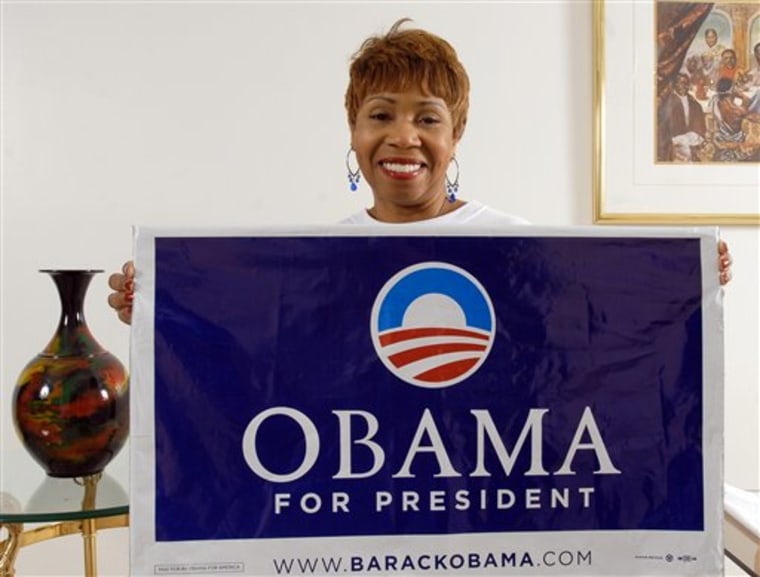Democrats in states that refused to join the stampede to the front of the presidential nominating calendar might end up with the final say by voting last.
Instead of being an afterthought in a contest that had already been decided, states with springtime primaries and caucuses may yet play a role in the hard-fought and unusually long-lived race between Democratic hopefuls Barack Obama and Hillary Rodham Clinton.
In Indiana, for example, which hasn't been in a position to help decide the Democratic nominee in 40 years, excitement is building among political supporters like Gelone Broadnax of Indianapolis, who began attracting attention when she donned an Obama campaign button recently.
"I started wearing my button and everybody is like: 'Where'd you get that? Where'd you get that?'" Broadnax said. "Man, if I could have some more Obama buttons — everybody wants one."
Broadnax, a court reporter in the Marion County court system, spent weeks helping collect petition signatures to get Obama on the ballot for Indiana's May 6 primary, taking them everywhere with her.
"I kept them in my purse," she said.
Dedicated campaigners gear up
Nearly 2,000 miles away, Sue Castner often spends 12 hours a day in her Portland, Ore., home organizing volunteers for the Clinton campaign. She traveled earlier to Iowa and Nevada for the campaign, but is now spending much of her time answering calls and e-mails from Oregon voters who see the looming importance of that state's May 20 primary.
"I'm getting dozens of people a day who say, 'I want to help, I want to help, what can I do?'" said the former marketing worker-turned-political activist. "For the sake of getting some sleep before May 20th, I would love for it to be over. It still could be a horse race."
Twenty-two states held Democratic nomination contests on Feb. 5, creating a virtual national primary. But instead of deciding the nominee as once expected, Super Tuesday turned out to be a split decision. Obama has since gained the upper hand, but neither candidate is close to the 2,025 delegates needed to secure the nomination.
Upcoming contests
The candidates now are focused on contests in four states on March 4, including the big prizes of Texas, with 193 delegates, and Ohio, with 141. However, even a clean sweep by Obama wouldn't be enough to put him over the top, and polls in Texas and Ohio indicate a close race.
Two other states hold Democratic contests next month: Wyoming, March 8, and Mississippi, March 11.
After that, more than 500 delegates wait to be awarded in the latest-voting states. Besides Indiana and Oregon, those include Pennsylvania on April 22, North Carolina on May 6, West Virginia on May 13, Kentucky on May 20, and Montana and South Dakota on June 3.
"Given that so many states have competed early, that makes some of those that come later that much more important," said Robert Schmuhl, a political analyst and University of Notre Dame professor.
System switches
But a fleeting chance at relevance isn't enough for some critics of the presidential primary system, who say permanent changes are needed.
Pennsylvania Gov. Ed Rendell, who was chairman of the Democratic National Committee during the 2000 election, says the current system is terrible because large, populous states do not have enough influence.
Rendell pushed unsuccessfully last year for Pennsylvania to move its primary up to Feb. 5.
"The only reason Iowa and New Hampshire didn't decide this is because there were split decisions," said Rendell, a Clinton supporter. "Both races could have been effectively over before Super Tuesday. We could have been talking about this as a coronation."
Rendell is among those who favor a switch to regional primaries. In 2005, a commission led by former President Carter and former Secretary of State James Baker backed establishing four regional primaries to be held after the Iowa caucus and New Hampshire primary.
That plan, developed by the National Association of Secretaries of State, calls for the regional primaries to be held at one-month intervals from March to June, with the regions rotating on the calendar every four years.
The advantages? Less expense for candidates and a chance for each region to go first in a 16-year cycle.
But getting 50 state legislatures to sign off on such a plan is a daunting task. Indiana Secretary of State Todd Rokita, a Republican who is president of the national association, said he expected it would take a mandate from the political parties to bring about the change.
"It is going to take both parties," Rokita said. "You can't do a reform like this without both parties."
For now, voters in states like Indiana are enjoying their first chance to be national players since 1968, when Robert Kennedy and Eugene McCarthy crisscrossed the state in their battle for the Democratic nomination.
"I think it is good that we aren't counted out," Broadnax said. "I think each state should be important."
